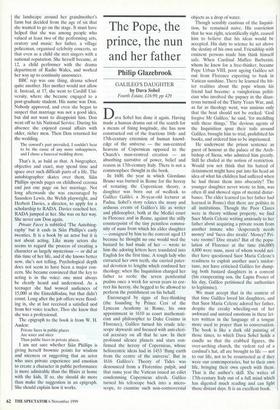The Pope, the prince, the nun and her father
Philip Glazebrook
GALILEO'S DAUGHTER by Dava Sobel Fourth Estate, L16.99, pp 429
Dava Sobel has done it again. Having made a human drama out of the search for a means of fixing longitude, she has now constructed out of the fractious 16th- and 17th-century extension of human knowl- edge of the universe — the sun-centred heavens of Copernicus opposed to the Church's man-centred creation — an absorbing narrative of power, belief and reason in 17th-century Italy. There is not a commonplace thought in the book.
In 1600, the year in which Giordano Bruno was burned in Rome for the heresy of restating the Copernican theory, a daughter was born out of wedlock to Galileo Galilei, a 36-year-old lecturer at Padua. Sobel's story relates the many and arduous events of Galileo's life as writer and philosopher, both at the Medici court in Florence and in Rome, against the stilly counterpoint of the tiny penniless commu- nity of nuns from which his elder daughter — consigned by him to the convent aged 13 because he thought no one would wed the bastard he had made of her — wrote to him the adoring letters here translated into English for the first time. A tough lady who extracted her own teeth, she carried pater- nal devotion to lengths which confused her theology: when the Inquisition charged her father to recite the seven penitential psalms once a week for seven years to cor- rect his heresy, she begged to be allowed to perform the punishment on his behalf.
Encouraged by signs of free-thinking (the founding by Prince Cesi of the Lyncean Academy in Rome, his own appointment in 1610 as court mathemati- cian and philosopher to Duke Cosimo in Florence), Galileo turned his crude tele- scope skywards and focused with anti-cleri- cal accuracy on all that he saw. In their profound silence planets and stars con- firmed the heresy of Copernicus, whose heliocentric ideas had in 1453 'flung earth from the centre of the universe'. But in 1616 Galileo's Theory of Tides was denounced from a Florentine pulpit, and that same year the Vatican issued an edict condemning Copernicus afresh. Galileo turned his telescope back into a micro- scope, to examine such non-controversial objects as a drop of water.
Though sensibly cautious of the Inquisi- tion, he remained naive. His conviction that he was right, scientifically right, caused him to believe that his ideas would be accepted. His duty to science he set above the destiny of his own soul. Friendship with eminent persons made him think himself safe. When Cardinal Maffeo Barberini, whom he knew for a free-thinker, became Pope Urban VIII, poor ageing Galileo set out from Florence expecting to bask in Vatican sunshine. There he learned the bit- ter realities about the pope whom his friend had become: a vainglorious politi- cian who involved the papacy in the disas- trous turmoil of the Thirty Years War, and, as far as theology went, was anxious only that the boat should not be rocked. 'God forgive Mr Galileo,' he said, 'for meddling with these things.' The devious agents of the Inquisition spun their toils around Galileo, brought him to trial, prohibited his books, and ordered him to be imprisoned.
He underwent the prison sentence as guest of honour at the palace of the Arch- bishop of Siena, who admired him greatly. Still he chafed at the notion of restriction. Would you not think that his hatred of detainment might have put into his head an idea of what his children had suffered when he had thrust them into obscurity? The younger daughter never wrote to him, was often ill and showed signs of mental distur- bance. The elder learned (as her father had learned in Rome) that there are politics in all institutions. Though the Poor Cares were in theory without property, we find Suor Maria Celeste writing anxiously to her father about acquiring a private room from another inmate who 'desperately needs money' and 'faces dire straits'. Money? Pri- vate rooms? Dire straits? But of the popu- lation of Florence at the time (66,000) 4,000 were nuns, most of whom would nei- ther have questioned Suor Maria Celeste's readiness to exploit another nun's misfor- tune, nor have criticised Galileo for dump- ing both bastard daughters in a convent (his exasperating son, the Lupin Pooter of his day, Galileo petitioned the authorities to legitimise).
We must accept that in the context of that time Galileo loved his daughters, and that Suor Maria Celeste adored her father, despite the creaky wheeling-out of her awkward and untried emotions in these let- ters written in the language of a tongue more used to prayer than to conversation. The book is like a dark old painting of those times, to which Dava Sobel holds a candle so that the crabbed figures, the over-arching church, the violent red of a cardinal's hat, all are brought to life — not to our life, not to be resurrected as if they were our contemporaries, but to their own life, bringing their own epoch with them. That is the author's skill. She writes of 17th-century Italy out of a full mind which has digested much reading and can light those distant days. It is an excellent book.


























































































 Previous page
Previous page